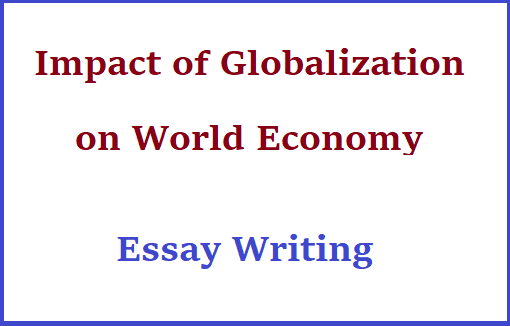Impact of Globalization on World Economy is very significant is this age of technological advancement. Globalization has Transformative Influence on the World Economy which made the entire world a very small place. Lets explore more about the impact of globalization on world economy in this essay.

Essay on Impact of Globalization on World Economy
Globalization has emerged as a dynamic force reshaping economies, cultures, and societies worldwide. Over the past few decades, advancements in technology, communication, and trade have accelerated the interconnectivity of nations, leading to profound changes in the world economy. This essay explores the multifaceted impact of globalization on the global economic landscape, touching upon its benefits, challenges, and implications.
Globalization encompasses a broad spectrum of economic, social, and cultural interactions that transcend borders. It involves the exchange of goods, services, information, ideas, and people across continents, leading to increased interdependence among nations. The rapid movement of capital, technology, and human resources has been a driving force behind the evolution of the global economy.
Impact of Globalization Economic Growth and Integration
Globalization has facilitated unprecedented economic growth by opening up new markets and opportunities for businesses. The expansion of international trade has enabled nations to specialize in producing goods and services where they possess a comparative advantage, leading to efficiency gains and higher living standards. Multinational corporations have leveraged globalization to access resources and labor across borders, contributing to increased investment and job creation.
Impact of Globalization on Technology and Innovation
The free flow of information and technological advancements have transcended geographic barriers, enabling innovation to flourish. Globalization has catalyzed knowledge-sharing, leading to collaborative research, development, and dissemination of groundbreaking technologies. This interconnectedness has fueled breakthroughs in various sectors, from healthcare to renewable energy, revolutionizing industries and improving quality of life.
Impact of Globalization on Cultural Exchange and Diversity
Globalization has also sparked cultural exchange and diversity, allowing people from different backgrounds to share ideas, art, music, and traditions. The blending of cultures has led to a richer and more interconnected global society, fostering mutual understanding and appreciation. However, it’s important to note that cultural assimilation and the erosion of traditional values can sometimes be challenges associated with this cultural convergence.
Challenges of Globalization
While globalization has undeniably brought numerous benefits, it has also generated challenges that need careful consideration. One significant issue is economic inequality, with certain regions and populations benefiting disproportionately from globalization while others struggle to keep up. This imbalance can lead to social unrest and disparities in access to resources and opportunities.
Environmental Concerns
Globalization’s impact on the environment is a critical concern. Increased trade and production can lead to higher carbon emissions, resource depletion, and habitat destruction. Addressing environmental challenges requires international cooperation and sustainable practices to ensure the long-term well-being of the planet.
Trade Imbalances and Dependency
Globalization has led to complex trade relationships, sometimes resulting in trade imbalances and dependency on specific goods or markets. Economic shocks in one region can have ripple effects globally, underscoring the importance of economic diversification and resilience.
Conclusion
The impact of globalization on the world economy is a multifaceted phenomenon that has shaped the way nations interact, trade, and collaborate. While it has fueled economic growth, technological advancement, and cultural exchange, it has also presented challenges that need careful management. As globalization continues to evolve, it calls for responsible policies that harness its benefits while addressing its complexities. Balancing the interests of diverse nations and ensuring equitable growth remains a global imperative in this interconnected age.
